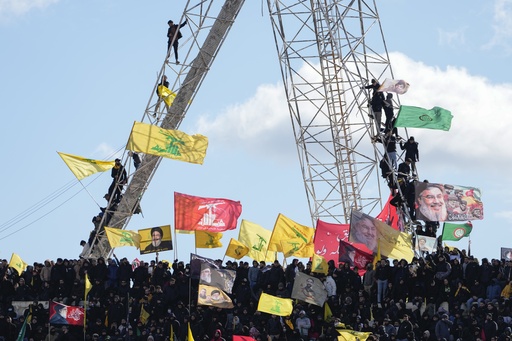
BEIRUT — A significant crowd gathered on Sunday, filling a stadium and surrounding streets in Beirut for the funeral of Hassan Nasrallah, the former leader of Hezbollah, who was killed in an Israeli airstrike nearly five months ago.
Nasrallah, who passed away after an Israeli air assault that involved more than 80 bombs dropped on Hezbollah’s main operations center in a southern suburb of Beirut, represented a considerable loss for the Iran-backed militant organization. He had led Hezbollah for over three decades, enhancing its influence throughout the Middle East and among various Iran-affiliated groups, including Iraqi, Yemeni, and Palestinian factions.
Nasrallah’s reputation grew significantly after the 2006 conflict with Israel, where Hezbollah achieved what many viewed as a stalemate. However, the group’s image has fluctuated since its involvement on the side of former President Bashar Assad during Syria’s civil war, leading to a dip in popularity across parts of the Arab region.
Hezbollah encouraged its supporters to attend the funeral in large numbers to demonstrate its resilience following substantial losses over a 14-month confrontation with Israel. According to a Lebanese official who wished to remain anonymous, the crowd was estimated to be around 450,000 attendees.
Ali Fayyad, a lawmaker affiliated with Hezbollah, stated, “This massive crowd confirms that Hezbollah is still the most popular party at the Lebanese level, and all claims regarding its weakness are misplaced.”
Among mourners was Sahar al-Attar, who traveled from Lebanon’s Bekaa Valley, expressing that, “We would have come even under bullets” to attend the funeral of Nasrallah. Both Nasrallah and his cousin, Hashem Safieddine, who was also killed shortly after in an Israeli airstrike, were honored during the memorial services. Nasrallah’s burial took place later that day in Beirut, while Safieddine was laid to rest in his hometown in southern Lebanon. Initially, both leaders were secretly buried in undisclosed locations.
As the coffins were displayed before the vast audience, attendees participated by throwing flowers and articles of clothing at the coffins, believing such gestures would bless them. The event was notably marked by large screens outside the stadium projecting the phrase: “We are committed to the covenant.”
Reports indicated that around 800 international dignitaries from 65 countries attended the ceremony, alongside numerous activists. Prominent figures included Iranian parliamentary leader Mohammad Bagher Qalibaf and Foreign Minister Abbas Araghchi, along with members of Lebanon’s parliamentary leadership. Some non-official representatives from Western countries were also present.
Iris activist Tara O’Grady, holding her national flag, revealed that she had come to Beirut to show solidarity with the Lebanese people against Israeli actions. She compared Nasrallah to Irish revolutionary Michael Collins. Her statements were made amid the sound of Israeli warplanes flying low over Beirut while the funeral procession was underway, prompting the crowd to chant anti-Israel slogans.
In response to the tensions surrounding the funeral, the Israeli Defense Minister stated that the flyovers were meant to convey a clear warning against any threats to Israel, asserting that such threats would lead to dire consequences. Around the same time, the Israeli military conducted strikes in southern and eastern Lebanon.
Hezbollah’s resilience is emphasized amidst ongoing challenges, including adherence to a ceasefire that restricts its armed presence along the Israeli border. The political landscape has shifted with the decline of the Assad family’s rule in Syria, affecting the flow of resources to Hezbollah. Opponents have called for the group to disarm and function solely as a political entity.
During a televised address at the funeral, Hezbollah’s current Secretary-General, Naim Kassem, affirmed the organization’s strength in both manpower and armament, claiming, “The resistance is still present and strong, and the inevitable victory is approaching.” Kassem, although not present at the stadium, made influential remarks urging for Israel’s withdrawal from certain occupied areas in southern Lebanon and declared that American influence would not be permitted in Lebanese affairs. He stated, “Israel will not achieve through politics what it could not win in war.”

